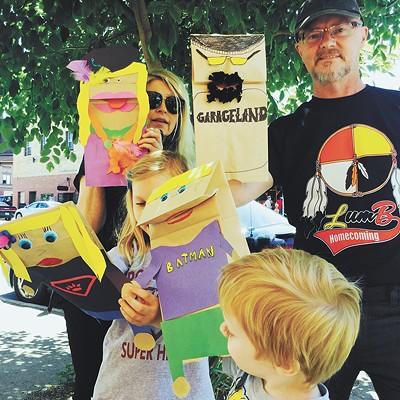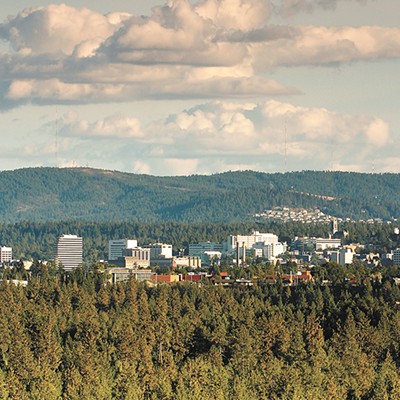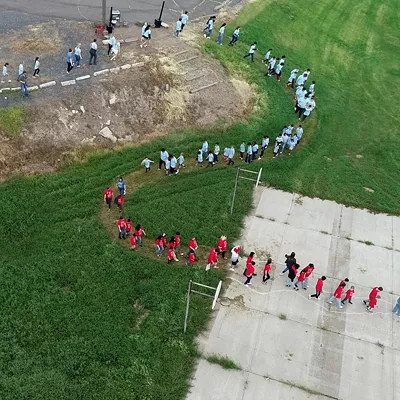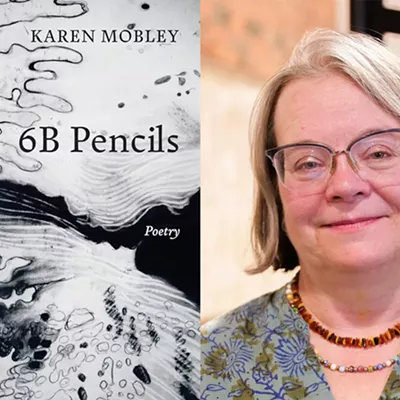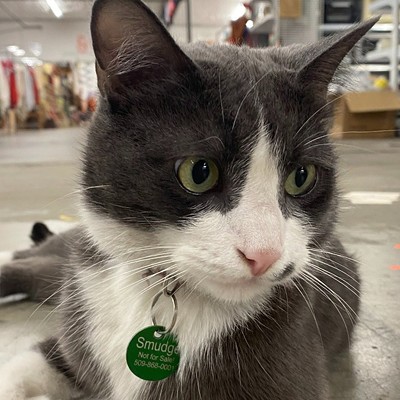You're floating through space. Afraid of heights? Don't look down as you pass over the unfathomably deep crevasses. Inside a massive cavern filled with branching passages, galactic bodies ringed in space dust are suspended all around. Planets spin in harmony as soft classical music guides your floating journey through the celestial setting.
Spaceships, time travel and alternate realities aren't needed should you embark on this wholly immersive adventure. As long as the technology required is at hand, anyone can float peacefully through the calming realms of outer space. But for now, at least, it'll have to be inside the Time Traveler Lounge at NovaWake Studio's east Spokane headquarters, where explorers can travel through space and time, and experience the magic of another reality — virtual reality.
The fledgling startup's aforementioned virtual reality (VR for short) experience, Gravity Compass, immerses users inside a vast, imaginary world — in what's more of an exploratory artistic project than a plot- or action-driven video game. Gravity Compass is just one of countless experiments in the emerging technology that employs 3-D headsets to make users feel like they've actually been transported inside the digital scene before them, which encompasses the human eye's full field of vision.
You've probably seen the futuristic headsets — clunky, big, lensless goggles in all black. Though not too sleek-looking from the outside, the limitless scope of digital worlds that can be projected to viewers on the inside are truly mind-boggling, especially to first-time users. Likewise, figuring out how to create these virtual worlds from a programming perspective is just as awe-inspiring.
"It's a total research and development project," says Lew Strachman, 68, one of NovaWake's two co-founders. His engineering-centric professional background includes leading a team that developed the first digital angiogram system for testing the human heart, and working on remote-sensing satellites.
"Everything is new. Just understanding how to move, how to construct the environments, the animations, the light. Everything has to take into account a whole new way of rendering and putting it together because it requires so much computing power," Strachman continues. "It's hard."
While gaming is one of the most fitting and widely explored early applications of virtual reality technology, industry experts and developers — including Strachman and NovaWake co-founder Anna Czoski — see its uses encompassing all disciplines, from art and education to communication, business, medical research and beyond. The possibilities at this stage of development and experimentation are innumerable.
Strachman likens the eventual widespread adoption of virtual reality to the jump from live theater to motion pictures when the latter was first introduced.
"It's a new way of thinking," he says. "A new way of accessing information. A new way of interacting with that information and with other people, and it has the potential to change how we think."
As it pushes boundaries in virtual reality programming and offering experiences open to the general public (because it's so new, VR experiences are currently fairly limited), NovaWake is also putting Spokane on the map for its contributions to the technology's development. The small, self-funded studio, which employs three computer programmers alongside the two founders, has opened one of the first virtual reality theaters in the U.S.
At NovaWake's Time Traveler Lounge, located at 1521 E. Illinois Ave., the public can experience its projects, like Gravity Compass (which was also featured at the Terrain arts showcase in October), for themselves in a living-room-like space filled with computers hooked up to VR headsets. The theater/arcade/studio hybrid is already listed as a venue on the movie ticketing site Fandango.
"It's important to note that our audience is not just the gaming marketplace, it's the same people who would visit a movie theater or watch television," Strachman explains. "Some are gamers, but it's a general audience, because the experience is possible for everyone."
One of those experiences that most resembles a video game is NovaWake's first project, Nova Asteroids. After strapping on the Oculus Rift headset, players, in a standing position, move their body to avoid being hit by asteroids flying toward them.
"People know the asteroids aren't going to come at you, but you feel the sort of anxiety you might have if something was rushing toward your face," Czoski explains.
Still in development with plans for more levels and features to be added, Nova Asteroids was featured for a few months this summer at the Northwest Museum of Arts & Culture, where hundreds of people tried the game, providing valuable feedback for the development team.
NovaWake has developed most of its products so far for the Oculus Rift, one of the leading virtual reality headsets on the market. Oculus' parent company was notably bought by Facebook last year for $2 billion. Currently its headsets are only available to developers; as of recently the kits were sold out.
At NovaWake, developers also are programming content on the HTC Vive headset. To create the games and experiences for these headsets, the team uses the cross-platform game creation software Unity. Czoski, 29, who has degrees in digital art and animation, oversees the art direction for the studio's projects. The team also is working on a story-driven experience based on Edgar Allan Poe's "The Tell-Tale Heart," and an interactive, multiplayer game that involves dinosaurs and the food chain.
"What's neat for me is that now the cost of VR and the computer power is low enough for a wide variety of people to experiment with it," Czoski says. "So people are finding innovative and unique ways of using it, and we can all use techniques that others have explored. That's why imagination is your only limitation." ♦
Through Dec. 31, NovaWake hosts a kiosk on the third level of River Park Square where the public can try out Gravity Compass and Nova Asteroids during mall hours for $6.






